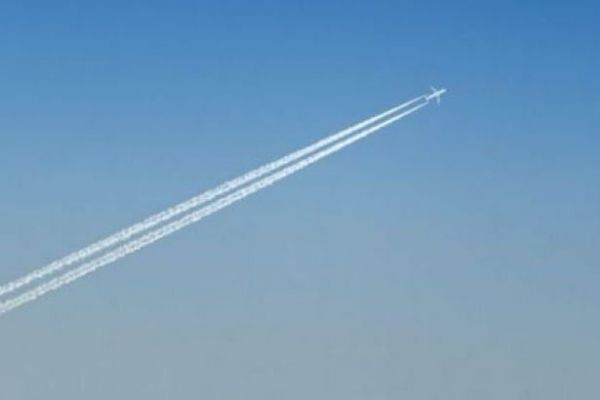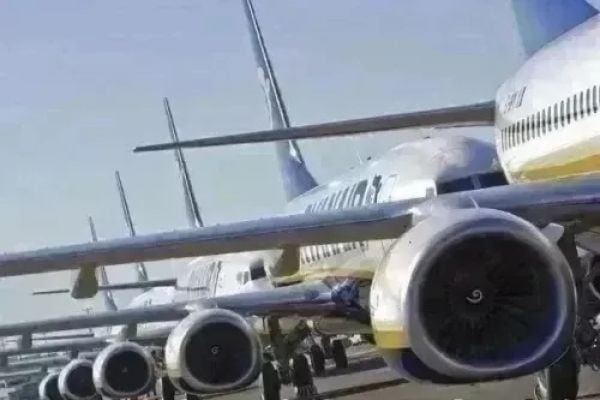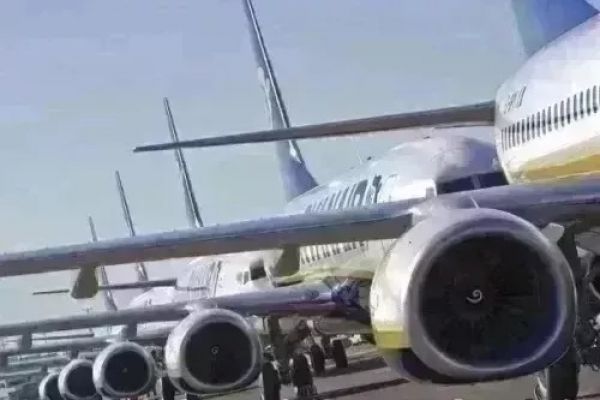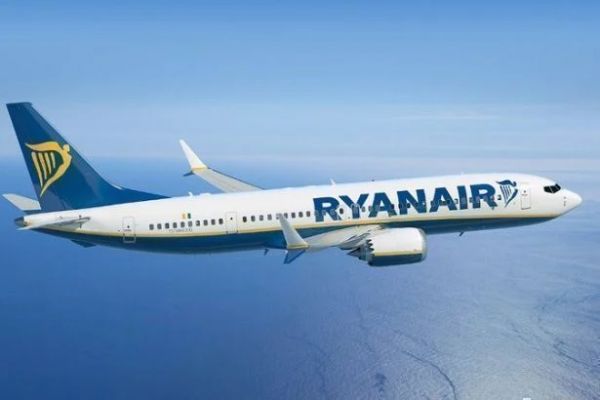Hospitality Ireland presents a round-up of the latest airline and aviation news from around the world.
Air France-KLM Unveils Tiny A220 Jet In Superjumbo's Shadow
Air France took delivery of its first compact Airbus A220 jetliner on Tuesday September 28, pledging greater comfort and lower emissions on short routes as its Franco-Dutch parent pushes ahead with a broader fleet shake-up to streamline costs.
The French airline, part of the Franco-Dutch Air France-KLM group, said the 148-seat, Canadian-designed jet would reduce fuel consumption and emissions by 20% after entering European service with a flight to Berlin on Oct 31.
Air France ordered 60 of the planes in 2019, with options for at least 30 more, to replace the smallest members of the Airbus single-aisle portfolio, the A318 and A319.
The unveiling illustrated a shift of emphasis from the world's largest jets to some of the smallest as airlines play up the lower cost and environmental benefits of light new models.
The audience of 300 guests including politicians gathered in a hangar originally built for the Airbus A380 superjumbo, once the flagship for Air France and other major long-haul carriers but whose retirement was accelerated by the coronavirus crisis.
In a reminder of the see-saw strategies in the $150 billion jet industry, a disused A380 sat ignored on the tarmac outside.
The A220 was developed by Canada's Bombardier, but its ambitions foundered over a lack of cash needed to unlock the stranglehold of Airbus and U.S. rival Boeing. Airbus picked up the A220 programme for a symbolic dollar in 2018.
Now, Air France-KLM is playing the two planemaking giants against each other for the next stage of a sweeping fleet review under Chief Executive Ben Smith, a former Air Canada executive who has vowed to simplify a fragmented fleet to cut unit costs.
He said the group would decide within months on a new order for at least 80 medium-haul jets in a busier category just above the A220, in what would be its biggest fleet transaction ever.
That follows a tender earlier this year to renew and expand the medium-haul Boeing 737 fleets at KLM as well as the French and Dutch operations of budget brand Transavia.
Smith said the deal could involve a firm purchase of 80 aircraft with options for another 60 to 80. Such a deal would be worth more than $8 billion at list prices before discounts that aircraft traders say can easily exceed 50% for large quantities.
Some analysts have suggested the competition is Boeing's to lose after a long association with KLM, but Smith stressed the group was in talks with both Boeing and Airbus.
The widely watched competition is between the A320neo and A321neo medium-haul jets on the Airbus side and Boeing's competing 737 MAX family. It comes amid resurgent demand from Europe's mainly debt-laden airlines for capacity to cut costs and respond to growing environmental pressure.
Beyond that, the group's fleet overhaul will see separate contests in around 2023 to replace earlier A320/A321 models and the A330 long-haul model: both on the Air France network.
For the future competition to replace the workhorse A320, Air France would be interested in a frequently mooted longer version of the A220, if Airbus launched one, Smith said.
Airbus Chief Commercial Officer Christian Scherer told Reuters the plane maker was studying the idea with a "positive attitude," but no decision was currently on the agenda.
Industry sources say its immediate priority is to cut costs on the loss-making A220 by pressuring suppliers to offer deeper price cuts and by redesigning parts to be built more cheaply.
Western Airplane Maintenance Providers Rush To Sign Chinese Contracts
Western aircraft maintenance, repair and overhaul providers (MROs) signed a flurry of new contracts with Chinese customers and joint-venture partners at the country's biggest air show this week to strengthen their foothold in the lucrative market.
The quick rebound in traffic in China's domestic aviation market to pre-COVID levels, coupled with large declines in other parts of the world, has made China even more important to providers trying to minimise pandemic-driven revenue hits.
"China is key to the future of aerospace because the centre of gravity of passenger traffic is moving east," Kailash Krishnaswamy, general manager at Spirit AeroSystems China, said on the sidelines of Airshow China in Zhuhai after signing a 10-year repair contract with cargo carrier SF Airlines. Spirit was attending the show for the first time.
Consulting firm Oliver Wyman estimates China's MRO market will be 8% larger this year than in 2019, making it one of two regions to surpass pre-pandemic levels, alongside eastern Europe. By 2031, it forecasts the MRO market in China will more than double its pre-COVID size to nearly $20 billion annually.
Honeywell International is a major supplier to Commercial Aircraft Corp of China's (COMAC) C919 narrowbody programme and is bidding for work on the Sino-Russian CR929 widebody, said its China president, Steve Lien.
Such deals give it a foothold for the future when maintenance is needed. Honeywell this week signed a provisional agreement to provide MRO services for its C919 auxiliary power units with the plane's first customer, China Eastern Airlines , and said it expected to sign up other carriers as COMAC ramps up production.
Like Spirit, it also sees strong prospects in the cargo market, which has been growing rapidly with the rise of e-commerce and typically uses older planes that require more maintenance than the latest generation of jets.
"The forecast forward for cargo is very strong," Lien said. "China's cargo capacity is not as mature globally as in the U.S. and Europe. But it is in the national interest to make it mature."
Boeing Co and Guangzhou Aircraft Maintenance Engineering Co Ltd (GAMECO) signed a deal at the show to set up two 767 freighter conversion lines next year.
Chinese airlines will need 8,700 new airplanes through 2040 worth $1.47 trillion at list prices, Boeing said in a forecast last week.
At a time when China is focused increasingly on production of homegrown planes, Boeing China President Sherry Carbary said her company's strength in services was key to giving it a market foothold over the longer term.
"It is the services that actually support that airplane over its life, over the next 20, 30, 40 years," Carbary said. "So it is not a one-time sale. It is a lifetime relationship that is very important to us."
Virgin Atlantic Delays IPO Plan Until Early 2022 - Source
Virgin Atlantic, the British airline founded by billionaire Richard Branson, has delayed its plan to list until early 2022 to focus on the reopening of the transatlantic market, said a person familiar with the situation.
The United States has said it will allow in fully vaccinated travellers from Britain and dozens of other countries in November, fully reopening Virgin Atlantic's main market for the first time in 18 months.
Virgin had been considering a float this autumn according to reports in August, but it will now wait until next year so it can focus on, and benefit from, the wider restart of travel between Britain and the US, the person said.
Bookings surged 600% the day when the US announced the rule change, Virgin said on September 21.
The airline, which is 51% owned by Branson through his Virgin Group while US group Delta Air Lines Inc owns the rest, declined to comment on its IPO plans.
Most airlines have struggled financially during the pandemic, but the long closure of US routes deepened the crisis for long-haul specialist Virgin. It survived thanks to a £1.5 billion rescue between Sept. 2020 and March 2021.
In addition to the IPO, Virgin was also considering other funding options, the person added.
Major EU Airlines Agree To Refund Passengers After Pandemic Flight Cancellations
A group of European airlines agreed on Thursday September 30 to refund passengers whose flights were cancelled during the COVID-19 pandemic, and committed to provide better information on passengers' rights in future.
After talks with the European Commission, 16 airlines agreed to clear refund backlogs, to better inform travellers when companies would cancel flights and to offer vouchers only when passengers chose them.
The airlines included Air France-KLM, British Airways, Easyjet, Lufthansa, Ryanair, TAP and Wizz Air among others.
"In the early phase of the pandemic, some airlines pushed vouchers on passengers," Didier Reynders, European commissioner for justice, said in a statement. "They were acting against EU consumer protection rules. That was unacceptable," he said.
National authorities in individual EU states are responsible for the enforcement of EU consumer protection laws. The EU law, the Consumer Protection Cooperation Regulation, has created a network of state enforcers to coordinate on such issues.
The EU Commission said this was the biggest Consumer Protection Cooperation action in the CPC network's history and the first action that was based on an alert from the Commission.
"Airlines have breached European consumer rights on a massive scale during the pandemic," Monique Goyens, general director of the European Consumer Organisation CEUC, which led the complaint to the EU in July 2020, said in an emailed statement.
"It's time for airlines to clean up their act...Many consumers across Europe are still waiting for their money back, for flights cancelled during the first lockdowns in 2020."
EU transport chief Adina Valean also welcomed the agreement, adding that it will restore trust between passengers and airlines. "The recovery of the air transport sector depends on this," she said.
United Airlines Cuts Number Of Workers Facing Termination Over Vaccine Noncompliance
United Airlines on Thursday September 30 the number of employees who are facing termination for defying the company's COVID-19 vaccine mandate.
The Chicago-based carrier said that only 320 US-based staff are now not in compliance with its COVID-19 vaccination policy, marking a 46% drop in the past two days.
Excluding those who have sought an exemption, United said 99.5% of U.S.-based employees now have been vaccinated against COVID-19.
United, which in early August became the first US carrier to require COVID-19 vaccinations for all domestic employees, had asked for proof of vaccination by Monday or face termination.
It later softened its position, saying workers could save their jobs if they chose to get vaccinated before their formal termination meetings.
Since Monday September 27, more employees have provided a proof of vaccination, a company spokesperson said. The airline expects a further decline in the number of unvaccinated staff in coming days.
Qantas To Bring Forward Restart Of International Flights To November
Qantas Airways Ltd said on Friday October 1 that it would restart some international flights a month earlier than planned after the Australian government said fully vaccinated Australians could enter and leave the country freely from November.
Qantas will operate three weekly return flights between Sydney and London and three weekly return flights between Sydney and Los Angeles starting Nov. 14 and add more flights if there is enough demand, the airline said.
Passengers will be required to quarantine at home for seven days upon arrival in Australia. The Australian government on Friday indicated that some of its eight states and territories would open earlier than others.
"We welcome the federal government's decision and the work by the New South Wales government to facilitate the home quarantine approach that makes this feasible," Qantas Chief Executive Alan Joyce said. "We look forward to other states and territories getting on board."
New South Wales is home to Australia's most populous city, Sydney.
Qantas said it had already sold out some of its international flights for December and it had seen strong demand for London and Los Angeles.
The airline grounded its international fleet in March 2020 and has operated only freight and repatriation flights since, with the exception of a short-lived quarantine-free travel bubble with New Zealand.
Rival Virgin Australia, which does far less international flying, did not announce any schedule changes but said it would continue to add flights as travel demand increased and restrictions eased.
India Government Says No Decision On Air India Sale After Report Cites Tata Sons As Winner
India's finance ministry said on Friday October 1 that reports suggesting that the government has picked a winning bid for the debt-laden state-run airline Air India were incorrect.
Earlier on Friday October 1, Bloomberg that a panel of ministers accepted a proposal from officials recommending salt-to-software conglomerate Tata Sons ahead of an offer from Ajay Singh, promoter of India's airline operator Spicejet Ltd.
"Media reports indicating approval of financial bids by government of India in the AI disinvestment case are incorrect," the ministry said in a tweet. "Media will be informed of the Government decision as and when it is taken."
Air India and Tata Sons declined to comment.
Earlier this month, the finance ministry said it had received bids for the airline, but did not name the bidders.
A possible sale would come at a time the airline industry is trying to recover from the slump in travel caused by restrictions aimed at containing the coronavirus pandemic.
This would also be seen as a relief to Prime Minister Narendra Modi's government, which has been pushing to sell its entire interest in the loss-making airline.
The winning bidder would win control of Air India's 4,400 domestic and 1,800 international landing and parking slots at domestic airports, as well as 900 slots at airports overseas, including London's Heathrow Airport.
It would also get 100% of the low-cost arm Air India Express and 50% of AISATS, which provides cargo and ground handling services at major Indian airports.
The government loses nearly 200 million rupees every day to run the national carrier, which has accumulated losses of over 700 billion rupees ($9.53 billion), officials have said.
An effort to auction a majority stake almost three years ago drew no bids, forcing the government to ease the terms. It had also extended the deadline multiple times during the pandemic.
News by Reuters, edited by Hospitality Ireland. Click subscribe to sign up for the Hospitality Ireland print edition.









